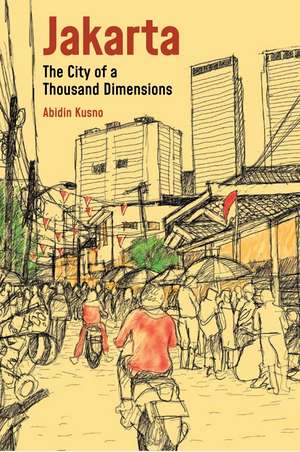Jakarta: City of a Thousand Dimensions: Across the Global South: Built Environments in Critical Perspective
Autor Abidin Kusnoen Limba Engleză Paperback – 19 aug 2023
Indonesian writer Seno Gumira Ajidarma has called Jakarta a city of a thousand dimensions. A megacity of 30 million under threat from rising sea levels and temperatures, Jakarta and its resilient residents improvise and thrive. This book teases out some of the dimensions that have given shape to contemporary Jakarta, including the city’s expanded flexibility in accommodating capital and labor, and the consistent lack of planning that can be understood as a result of both politics and the poetics of governing in the region. Jakarta is essential reading for those seeking to understand one of Asia's most dynamic cities.
Preț: 222.18 lei
Nou
Puncte Express: 333
Preț estimativ în valută:
42.53€ • 44.68$ • 35.74£
42.53€ • 44.68$ • 35.74£
Carte indisponibilă temporar
Doresc să fiu notificat când acest titlu va fi disponibil:
Se trimite...
Preluare comenzi: 021 569.72.76
Specificații
ISBN-13: 9789813252264
ISBN-10: 981325226X
Pagini: 304
Ilustrații: 33 halftones
Dimensiuni: 152 x 229 x 20 mm
Greutate: 0.37 kg
Editura: Nus Press Pte Ltd
Colecția National University of Singapore Press
Seria Across the Global South: Built Environments in Critical Perspective
ISBN-10: 981325226X
Pagini: 304
Ilustrații: 33 halftones
Dimensiuni: 152 x 229 x 20 mm
Greutate: 0.37 kg
Editura: Nus Press Pte Ltd
Colecția National University of Singapore Press
Seria Across the Global South: Built Environments in Critical Perspective
Notă biografică
Abidin Kusno is professor in the faculty of environmental and urban change at York University, Toronto, and former director of the York Centre for Asian Research.
Cuprins
Dedication List of Figures
Preface
Introduction: A City with a Thousand Dimensions: Theory, Practice, Subjectivity
1. Middling Urbanism
2. The Rule of Many Orders
3. Roads, Rhizomes and Regimes
4. Where will the Water Go?
5. A New Assemblage City
6. Urban Politics
7. Islamist Urbanism
8. Escape from Jakarta: The Future Redux
9. Jakarta: A Conversation
10. Our Streets: Reflections on a Pandemic City
Afterword: On “Multitude” and the Urban Question: A Reading in a Time of Pandemics
Bibliography
Index
Preface
Introduction: A City with a Thousand Dimensions: Theory, Practice, Subjectivity
1. Middling Urbanism
2. The Rule of Many Orders
3. Roads, Rhizomes and Regimes
4. Where will the Water Go?
5. A New Assemblage City
6. Urban Politics
7. Islamist Urbanism
8. Escape from Jakarta: The Future Redux
9. Jakarta: A Conversation
10. Our Streets: Reflections on a Pandemic City
Afterword: On “Multitude” and the Urban Question: A Reading in a Time of Pandemics
Bibliography
Index
Recenzii
“This collection of essays is as thoughtful a recent account of Jakarta as may be found. An enjoyable preface and introduction lead from the personal into the book’s main themes, then successive chapters explore the nature of the kampung community, traffic and congestion, flooding, new towns, urban politics, Islamist urbanism, and the proposed relocation of the capital, followed by the author in conversation, including his reflections on the impact of the pandemic and a thoughtful neo-Marxist discourse on urban theory…. Whether or not the reader is familiar with Jakarta, there is much with which to engage.”
"[A] wide-ranging yet in-depth study of the city and its multi-dimensional challenges contains a felicitous mix of theoretical investigations grounded in real-life examples. . . Kusno shows what can be done when people come together, whether in the face of flooding, traffic or the desire of government and developers to flee the city. Left alone, the people who call Jakarta home will very likely flourish."
"No scholar has more persuasively assessed the transformation of twentieth century Jakarta (and urban Indonesia in general) than Abidin Kusno. Jakarta: The City of a Thousand Dimensions brings his analysis to the present through a
critical appraisal of how the urban environment and governance have been shaped since Indonesia’s transition to decentralization."
critical appraisal of how the urban environment and governance have been shaped since Indonesia’s transition to decentralization."
“On the whole, the book is well-researched, well-written, persuasive…. The book is suitable for use by a general, educated audience interested in Jakarta, South East Asian Studies, or Global South urbanism. Members of this audience include–but are not limited to–graduate students, university professors, artists, journalists, architects, city planners, property developers, politicians and NGO activists.”
“Abidin Kusno now has a solid track record of three prior texts, each a revelation and incisive in its uncompromising avoidance of methodology…. Jakarta is another revelation in the analysis of urban development, where each chapter is like one piece of a Rubik Cube that does not reveal itself as whole until the final element is set in place.”
"Brimming with details, nuance, and anecdotes, this rich and complex assemblage of insights into multiple dimensions of urbanization and urbanism in Jakarta could help us produce narratives of other cities in critical yet stimulating ways."
"The urban is a mellifluous, often malevolent, cacophony of enactments, encumbered by plunder, and enlivened by singular inventions—a process no more illustriously embodied than by Jakarta, which has never been as brilliantly explored nor exorcised as in Kusno’s meditations on urban governmentality as a means of ruling from the middle of things, a constant re-arrangement of oscillating fragments and power relations still fumbling for a universal ideal."
"Richly textured, revealing, brilliant and original, Abidin Kusno’s Jakarta constitutes an object lesson in urban analysis, where memory, archetype and self, generate complex substrata to our understanding of cities. Jakarta is a revelation, a new way of exposing the invisible, and a method of talking to the multitude and the common in all of us."
"Placing his personal experiences of the metropolis in conversation with western social theory, Kusno conveys the insights that thinking through Jakarta makes possible. This essay collection, examining Jakarta’s everyday life, complex spatiality, variegated stakeholders and political, mobility and environmental challenges, will enable the reader to appreciate how Jakarta works."
